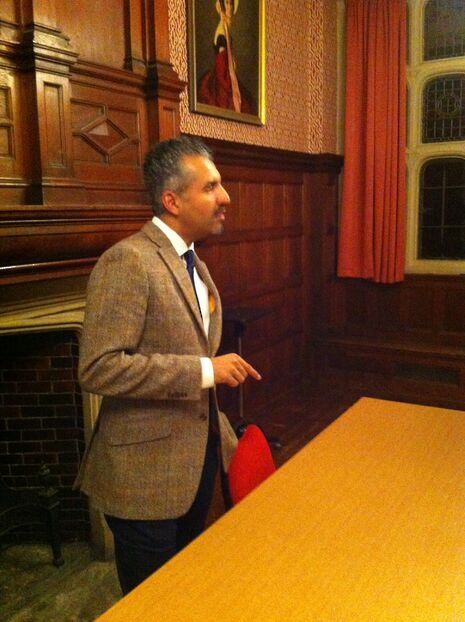Former extremist seeks parliamentary seat
Maajid Nawaz spent four years as a political prisoner in Egypt. He is now hoping to become a Liberal Democrat MP. Hannah Wilkinson and Louis Degenhardt ask him about his transformation

Forget Russell Brand and his shaggy-haired revolutionary ramblings. If you want to know about political disaffection, talk to director of the Quilliam Foundation, Maajid Nawaz.
“I’ve been there and I’ve done that, and I took it a lot more seriously than he does,” says the reformed extremist. “I actually recruited army officers, I attempted to overthrow governments and was imprisoned for it.”
Before becoming the director of a counter-extremism think tank and a Liberal Democrat parliamentary candidate, Nawaz was an international recruiter for Islamist revolutionary group Hizb ut-Tahrir.
Rather than duelling in a comfy television studio with Jeremy Paxman, the young Nawaz took his revolutionary rhetoric to Denmark and Pakistan and finally to Egypt, where he was incarcerated as a political prisoner for nearly five years by the Mubarak regime.
Nawaz is all too familiar with the mindset of the disaffected youth. He now values democracy as a system of government and worries that the Brand-esque approach to politics will have greater consequences than the comedian imagines. “When you disengage from a democracy, in the Islamist context, it leads to Islamist extremism, in the non-Muslim context it leads to fascism,” he warns.
Nawaz founded the Quilliam Foundation in the UK and Khudi in Pakistan – a grassroots movement set up to challenge that extremist “organised minority” claiming a monopoly on public morality. Both organisations seek to challenge extremist thought, and he sees initiating this debate as a first step to addressing the problem.
Nawaz hopes to represent these same causes as Liberal Democrat MP for Hampstead and Kilburn come 2015, should his campaign be successful. “I joined the Lib Dems…because of its civil liberties track record; it was the only party that opposed the Iraq war. It values human rights and a respect for individual liberty.”
He talks about the need for Britain to “heal,” and sees his act of standing as part of the reconciliation process. He would be the first parliamentarian to speak fluent Arabic, and is the first self-described former Islamist to stand for parliament in any Western democracy.
Whilst locked up in Egypt, Nawaz’s case was picked up by Amnesty International who adopted him as a prisoner of conscience, so he acknowledges the argument that human rights doctrine might amount to more than Western neo-colonialism.
During his five year ordeal, Nawaz continued exploring his faith under Islamic scholars also imprisoned by Mubarak. His studies led him to divorce the extreme, politicised Islam with which he had been indoctrinated from a more personal religion, which allows Muslims not only to live with faith at the centre of their life, but also to reclaim notions of democracy, pluralism and human rights.
These may be values central to Nawaz’s ideology, but are also, he claims, values perfectly natural to Islam.
“What we’re attempting to do is to get Muslims to re-interpret not the irreligion but their relationship with the religion, to say that you don’t have to go for it for every single thing.” He urges Islamic scholars and liberals not to fear coming across as ‘preachy’: “it needs to become taboo to say bigoted Islamist things.”
“We’re trying to de-politicise democratic advocacy. Detach it from the West. So that whole answer about how it’s not inconsistent with Muslim tradition to call for pluralism, and to call for separation of church and state, rather, that is the tradition, to re-claim those ideas.”
In the same vein, he is pleased that his recent assistance helping Tommy Robinson leave the English Defence League (EDL) has hampered the effectiveness of the far-right’s anti-democratic, mob mentality. He even half-jokes at one point in his speech that “there’d be a place for Tommy Robinson in the Conservative Party” – at least then there would be room for dialogue.
It is discussion that he sees as vital for society. An idea, he argues, cannot be defeated through assassinating individuals or banning organisations, but only through addressing it directly.
Despite receiving death threats from Al Shabab, Nawaz has been one of the most passionate defenders of its right to exist. That’s why he is going around the country with Tommy Robinson speaking to Muslim and EDL groups, in an attempt to find some common ground.
It’s not difficult to see how Nawaz might have been a successful recruiter for Hizb ut-Tahrir. Cool and charismatic, if Nawaz had made the Liberal Democrat’s public apology for tuition fees, students might have accepted it.
Nawaz refuses to compromise on his principles. He has been critical of both right and left, arguing that while the right-wing “democracy at the barrel of a gun approach” is dangerous, the left have refused to acknowledge the complex roots of Islamic extremism, denying that “there are people out there who use the ideology cynically.”
Not afraid of picking battles, Nawaz has criticised elements of the press for fundamentally agreeing with the EDL, but also sees Unite Against Fascism as part of the problem. He claims that anti-fascist campaigners revel in their conflict with the EDL and depend on its survival to justify their activism.
Going forward, Nawaz will need all the charisma he can muster.
 News / Fitz students face ‘massive invasion of privacy’ over messy rooms23 April 2024
News / Fitz students face ‘massive invasion of privacy’ over messy rooms23 April 2024 News / Climate activists smash windows of Cambridge Energy Institute22 April 2024
News / Climate activists smash windows of Cambridge Energy Institute22 April 2024 News / Copycat don caught again19 April 2024
News / Copycat don caught again19 April 2024 News / Emmanuel College cuts ties with ‘race-realist’ fellow19 April 2024
News / Emmanuel College cuts ties with ‘race-realist’ fellow19 April 2024 Comment / Does Lucy Cavendish need a billionaire bailout?22 April 2024
Comment / Does Lucy Cavendish need a billionaire bailout?22 April 2024





